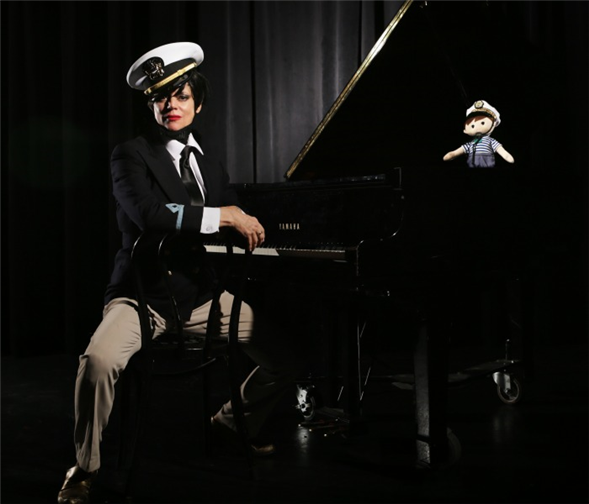Translate Page

Writer-performer Phoebe Legere examines the unconventional life of Joe Carstairs
---
"I could die during this show," jokes Phoebe Legere as she soars above the stage in a motorboat in Speed Queen. A fusion of theatre, dance, and video, Legere's solo musical chronicles the groundbreaking life of early 20th-century speedboat champion and oil heiress Marion Barbara "Joe" Carstairs, who presented as male and had a succession of famous female lovers including Tallulah Bankhead, Marlene Dietrich, and Billie Holiday. If you've never heard of Carstairs, it's probably because, like many bold women throughout history, her story has been suppressed.
That's something Carstairs and Legere have in common. A songwriter, performer, artist, filmmaker, and multi-instrumentalist who trained at Juilliard, Legere seemed on the verge of breaking through a few decades ago. She had a recording contract, toured with David Bowie, and appeared in the cult films Mondo New York and The Toxic Avenger series. But she never hit the mainstream. "Those were the Bush Sr. years and I was heavily marginalized for doing my thing," she says. An artsy, out-and-proud lesbian like Legere was too much for that conservative era, but she refused to conform. Instead, she embraced her downtown diva status and embarked on a variety of personal projects, including genre-breaking albums, the musical poem The Waterclown (which was nominated for a Pulitzer), and the creation of the Foundation for New American Art, a nonprofit that brings art and music to low-income children.
Speed Queen marks Legere's return to the New York theatre scene after a long absence. Commissioned by stalwart Off-Off Broadway company Dixon Place, the show's timing couldn't be better. With the gender-fluid generation just coming of age, it's the ideal moment to look back on one of the movement's pioneers.
{Image1}
"To me, Joe is the original transgender superhero," says Legere. "She refused to back down and do what others expected. When she told her mother, 'Mama, I'm a boy,' her mother said, 'Oh no my dear!' and shipped her away. So here's this girl who's been abandoned by her father and rejected by her drug addict mother. It's amazing that she was able to hold onto herself at all."
Legere's signature blonde locks and retro bombshell allure are hidden as she channels the charismatic Carstairs. Sporting Carstairs's signature "boatman of leisure" garb and folksy swagger, Legere taps into the intense emotions that fueled this uncommon woman's life. She addresses the audience like a long-lost friend, sharing seminal moments in story and song: Carstairs's strained relationship with her mother; her stint as an ambulance driver in World War I with the American Red Cross; her unconsummated marriage of convenience, which was quickly annulled; her boat-racing prowess; the island she purchased in the Bahamas; and her lesbian affairs. The stage is bare save for Legere's piano and two powerful onstage symbols: Carstairs's suspended powerboat, Estelle, named after her mother, and the beloved doll Lord Tod Wadley, given to her by a cherished girlfriend.
Legere actually met Carstairs before she died in 1993. "I was performing in the Hamptons, but I was poor," Legere recalls. Carstairs gave her a generous tip and a lift back to her shack, and that chance encounter inspired Legrere to create the show. "The written biography left out a lot," Legere says, including the details of Carstairs's affair with Marlene Dietrich. Legere celebrates their romance in an accordion song that summons the spirit of Weimar Germany, as the Hollywood movie star explains why she doesn't have the courage to live as openly as Carstairs.
One of the show's most powerful sequences recalls when Carstairs was nearly murdered by a German solider during WWI until she seized a rifle and dispatched him with savage fury. But when a British army officer came upon the scene, instead of commending her, he dismissed her as "just a girl." Legere also knows what it's like to be written off, and her empathy for Carstairs is obvious throughout. It's challenging to be a woman ahead of her time, but that's what led both Carstairs and Legere down such singular paths at breakneck speed.
---
TDF MEMBERS: At press time, discount tickets were available for Speed Queen. Go here to browse our current offers.
A dancer and playwright, Juan Michael Porter II has contributed articles to Ballet Review, The Dance Enthusiast, Broadway World, and HuffPost. Follow him at @juanmichaelii. Follow TDF at @ TDFNYC.
Top image: Phoebe Legere in Speed Queen. Photos by Peter Yesley.